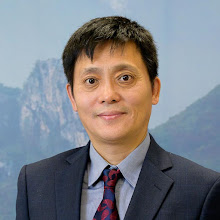Tiejun Tang
Do you
suffer from depression?
We all
have times when we feel down, but for most of us it is short lived, perhaps
lasting for a few days. However, for those with depression the feeling of
sadness and anxiety will often persist for weeks, months or even years.
Depression is one of the leading psychological disorder. According to the World Health Organization (WHO), depression is the leading cause of disability worldwide, affecting more than 264 million people of all ages. In the UK. According to the National Institute for Health and Care Excellence (NICE), around one in six people in the UK will experience depression at some point in their lives.
Depression does not discriminate. Regardless of social status, wealth, employment, age, gender, it can affect anyone in society.
It has become common practice for Psychiatrists and Psychologists to prescribe antidepressants as the first line of treatment for many mental health disorders. However, this is not without side effects; certain antidepressants have shown to cause sexual dysfunction in men (Jeffrey H. 1995), and cardiovascular toxicity in both sexes. (Pal Pacher, 2004). Although antidepressants have proven to be effective in reducing suicidal rates amongst patients, most people still prefer not to take them because of the side effects and instead opt for conventional or alternative treatment.
Remember, you are not alone in your battle against depression. No matter the duration of your symptoms, help and support is available and recovery is possible. There is no one treatment that fixes all. Everyone responds differently to different treatments. As a TCM Practitioner, I would like to offer my insight on how depression can and have been successfully treated through Chinese medicine.
In traditional Chinese medicine, depression falls within the category of Yu Zheng (郁证) and Zang Zao (脏躁). Chinese medicine believes that low mood, anxiety and irritability are caused by liver qi stagnation; insomnia, dream disturbed sleep, memory loss and palpitation are due to heart shen disorder; poor appetite and low energy and other indigestion symptoms are due to spleen deficiency; hot flush, night sweat and dry mouth are due to yin deficiency; cold extremities, pale complexion and low libido are due to kidney yang deficiency.
Xiaoyao Wan is a traditional Chinese medicine formulation that has been used for centuries to treat various mental and physical health conditions, including depression. Several clinical studies have been conducted to investigate the antidepressant effect of Xiaoyao Wan and the mechanism of its action. These studies have found that Xiaoyao Wan can significantly reduce the severity of depressive symptoms in patients with major depressive disorder, postpartum depression, and other types of depression.
One study published in the Journal of Psychiatric Research in 2016 examined the effect of Xiaoyao Wan on brain activity in patients with major depressive disorder using functional magnetic resonance imaging (fMRI). The study found that Xiaoyao Wan increased activity in the anterior cingulate cortex and the dorsolateral prefrontal cortex, two regions of the brain that are associated with the regulation of mood and emotion.
My colleagues in China use molecular biology techniques investigated the anti depression mechanism of Xiaoyao San. Their research found that Xiaoyao Wan can improve depressive-like behaviors by triggering autophagy to alleviate neuronal apoptosis. It is an effective supplement for depression treatment, and can be harnessed to enhance autophagy and synergize with antidepressant action.(Wang M 2019)
Except Xiaoyao Wan, Chaihu Shugan Wan or Guipi Wan. Ganmai Dazao Tang and Suanzaoren Tang also can be selected in the treatment of different type of depression,
The selection of acupuncture points should focus on the liver and heart meridians, combining with specific points on the Du meridian and extra points on the head. The points that are commonly used include, Taicong (LV3), Ligou (LV5), Zhangmen (LV13), Qimen (LV14), Shenmen (HT7), Shaohai (HT3), Neiguan (PC6), Baihui (DU20), Shenting (DU24), Yintang (EX-HN3), Taiyang (EX-HN5).
Apart from needling, Tuina massage techniques (especially on the
head points as mentioned above) will also help relieve symptoms. Many clinical
trials have shown that acupuncture can effectively treat depression. Treatment
methods included manual acupuncture (John J 1998), electric acupuncture (Huan
Cui 2004), and laser acupuncture (Joo Smith 2005). These research reports
showed acupuncture could significantly relieve depression.
Lastly, enjoy your Christmas, enjoy your life. To be depression-free is the
first step
to a healthier and happier new year!
Reference:
- Jeffrey H. Male Sexual Side Effects Associated with Antidepressants: A Descriptive Clinical Study of 32 Patients. The International Journal of Psychiatry in Medicine 1995; 25(2): 191-201.
- Pal Pacher. Cardiovascular Side Effects of New Antidepressants and Antipsychotics: New Drugs, old Concerns? Curr Pharm. 2004; 10(20): 2463–2475.
- Wang M. Modified Xiaoyao San ameliorates depressive-like behaviors by triggering autophagosome formation to alleviate neuronal apoptosis. Biomed Pharmacother. 2019; Mar;111:1057-1065.
- John JB. The Efficacy of Acupuncture in the Treatment of
Major depression in Women. Psychological Science. 1998; 9(5): 397-401.
- Han
Cui. Clinical study on Electro-acupuncture
treatment for 30 cases of mental depression. Journal of Traditional
Chinese Medicine. 2004; 24 (3): 172-176.
- Joo
Im. Laser acupuncture for mild to moderate
depression in a primary care setting – a randomised controlled trial
Acupunct Med 2005; 23(3):103-111.


Bundle of thanks for sharing this Information with us. I will share it on my website so that other person can take benefit from it.
ReplyDelete